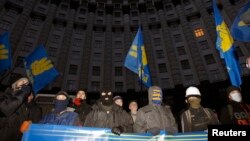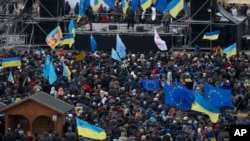KYIV —
Ukrainian protesters blockaded the main government building on Monday, seeking to force President Viktor Yanukovych from office with a general strike after hundreds of thousands demonstrated against his decision to abandon an EU integration pact.
Demonstrations on Saturday and Sunday, which saw violent clashes with the police, drew as many as 350,000 people, the biggest public rally in the ex-Soviet republic since the “Orange revolution” against sleaze and electoral fraud nine years ago.
Prime Minister Mykola Azarov accused the opposition of planning to seize the parliament, while Yanukovych appealed for calm, saying protests should be peaceful and law-abiding.
“Any bad peace is better than a good war,” Yanukovych said in his first comment on the mass unrest over the weekend. “Everyone must observe the laws of our state.”
In a sign that he felt the security situation was under control, though, Yanukovych announced he would stick to a plan to travel on Tuesday to China, from which he is seeking loans and investment to avert a debt crisis.
Yanukovych’s decision to abandon a trade pact with the European Union and instead seek closer economic ties with Russia has stirred deep passions in a country where many people yearn to join the European mainstream and escape Moscow's orbit.
The resulting unrest has hammered Ukraine's financial markets, underlining the fragile state of the economy.
The central bank was forced to intervene to prop up the hryvnia and threatened more action, underlining Kyiv's vulnerability as it seeks more than $17 billion next year to meet gas bills and debt repayments.
Russian President Vladimir Putin blamed outside actors for the protests, which he said amounted to an attempt to unsettle Ukraine's legitimate rulers.
“This reminds me more of a pogrom than a revolution,” Putin told reporters on a visit to Armenia.
Protesters in the capital remained defiant.
“We have no other choice but to defend ourselves and the gains we have made,” said Taras Revunets, at Kyiv's city hall, which hundreds of demonstrators occupied on Sunday.
With many worried that the unrest could endanger their savings, the central bank sought to head off panic withdrawals.
In a video statement, its chairman said the bank would not introduce any financial restrictions. “I urge everyone to have confidence in the banking system and maintain their savings,” said Ihor Sorkin.
Ukraine divided
Ukraine is divided between those who see stability in close ties with Russia and those who look westwards and see a more prosperous future with the European Union. Since his election in February 2010, Yanukovych has sought to straddle the divide, reassuring Ukrainians he could pursue close ties with Europe while managing relations with Moscow.
Even some supporters were shocked by the abruptness with which his government announced it was suspending work on a long-awaited pact with the EU in favor of reviving economic ties with Russia. Scenes over the weekend of police beating demonstrators hardened opinion against him.
“Yanukovych will do whatever Putin tells him to do,” said Oleksander, 49, on Kyiv's Independence Square, where protesters are setting up tented camps in preparation for a long campaign.
“He's been losing his legitimacy for a long time. His decision to send police in to beat up children was the last straw,” said Oleksander, adding he had voted for Yanukovych in the past and had joined the president's Party of the Regions.
Thousands of protesters listened to music and strolled through the city center on Monday behind makeshift barricades they had erected overnight from city benches, commandeered police barriers and parts of a giant artificial Christmas tree.
Traffic was cut off in central Kyiv but pedestrians still shopped and walked to work. Opposition figures made speeches at a central stage erected across from Independence Square. Orthodox Christian priests said prayers for the injured.
Police, who clashed with protesters at several spots around Independence Square during the weekend, have since withdrawn and were little in evidence in the city center on Monday.
General strike
Yanukovych's government struggled to show on Monday that it was still functioning, with protesters blocking the access road to the main government building with trash bins and other obstacles, and many employees turned back.
Former interior minister Yuri Lutsenko, now an opposition figure, said: “What is happening now around the government building is a strike.”
The National Bank and the finance and economy ministries were functioning, their press services said. City authorities, whose central premises were still in the hands of protesters, said basic services including public transport and hospitals were working normally in the city of three million.
Ukraine's debt insurance costs surged to the highest in more than two months. Its dollar bonds tumbled.
A spokesman for Azarov said employees were not able to enter the main government building in Kyiv and negotiations were under way to get them in. Azarov's deputy, Serhiy Arbuzov, appeared at a meeting with a parliamentary committee, saying: “I'm here to show the government is working.”
At the insistence of the opposition, parliament is scheduled on Tuesday to discuss and vote on whether to allow a motion of no confidence in the government. It needs to muster 226 parliamentarians for any vote and usually gets far less.
He defended the decision to walk away from the free trade deal with Europe, arguing among other things it did not do enough to protect Ukrainian producers and saying a Ukrainian delegation would go to Russia this week for negotiations on economic relations.
It was difficult to evaluate how much support the opposition's call for a general strike was receiving.
Alexei Ostrovsky, 36, who works in advertising but went to the protests instead of to work, said: “I decided I have to be here. I think my bosses will understand that and don't fire me.”
In Lviv, Ukraine's second city known for its pro-European outlook, authorities said those striking were mainly private businesses and students. The strike call was not having an impact on regional industry or public transport, they said.
Demonstrations on Saturday and Sunday, which saw violent clashes with the police, drew as many as 350,000 people, the biggest public rally in the ex-Soviet republic since the “Orange revolution” against sleaze and electoral fraud nine years ago.
Prime Minister Mykola Azarov accused the opposition of planning to seize the parliament, while Yanukovych appealed for calm, saying protests should be peaceful and law-abiding.
“Any bad peace is better than a good war,” Yanukovych said in his first comment on the mass unrest over the weekend. “Everyone must observe the laws of our state.”
In a sign that he felt the security situation was under control, though, Yanukovych announced he would stick to a plan to travel on Tuesday to China, from which he is seeking loans and investment to avert a debt crisis.
Yanukovych’s decision to abandon a trade pact with the European Union and instead seek closer economic ties with Russia has stirred deep passions in a country where many people yearn to join the European mainstream and escape Moscow's orbit.
The resulting unrest has hammered Ukraine's financial markets, underlining the fragile state of the economy.
The central bank was forced to intervene to prop up the hryvnia and threatened more action, underlining Kyiv's vulnerability as it seeks more than $17 billion next year to meet gas bills and debt repayments.
Russian President Vladimir Putin blamed outside actors for the protests, which he said amounted to an attempt to unsettle Ukraine's legitimate rulers.
“This reminds me more of a pogrom than a revolution,” Putin told reporters on a visit to Armenia.
Protesters in the capital remained defiant.
“We have no other choice but to defend ourselves and the gains we have made,” said Taras Revunets, at Kyiv's city hall, which hundreds of demonstrators occupied on Sunday.
With many worried that the unrest could endanger their savings, the central bank sought to head off panic withdrawals.
In a video statement, its chairman said the bank would not introduce any financial restrictions. “I urge everyone to have confidence in the banking system and maintain their savings,” said Ihor Sorkin.
Ukraine divided
Ukraine is divided between those who see stability in close ties with Russia and those who look westwards and see a more prosperous future with the European Union. Since his election in February 2010, Yanukovych has sought to straddle the divide, reassuring Ukrainians he could pursue close ties with Europe while managing relations with Moscow.
Even some supporters were shocked by the abruptness with which his government announced it was suspending work on a long-awaited pact with the EU in favor of reviving economic ties with Russia. Scenes over the weekend of police beating demonstrators hardened opinion against him.
“Yanukovych will do whatever Putin tells him to do,” said Oleksander, 49, on Kyiv's Independence Square, where protesters are setting up tented camps in preparation for a long campaign.
“He's been losing his legitimacy for a long time. His decision to send police in to beat up children was the last straw,” said Oleksander, adding he had voted for Yanukovych in the past and had joined the president's Party of the Regions.
Thousands of protesters listened to music and strolled through the city center on Monday behind makeshift barricades they had erected overnight from city benches, commandeered police barriers and parts of a giant artificial Christmas tree.
Traffic was cut off in central Kyiv but pedestrians still shopped and walked to work. Opposition figures made speeches at a central stage erected across from Independence Square. Orthodox Christian priests said prayers for the injured.
Police, who clashed with protesters at several spots around Independence Square during the weekend, have since withdrawn and were little in evidence in the city center on Monday.
General strike
Yanukovych's government struggled to show on Monday that it was still functioning, with protesters blocking the access road to the main government building with trash bins and other obstacles, and many employees turned back.
Former interior minister Yuri Lutsenko, now an opposition figure, said: “What is happening now around the government building is a strike.”
The National Bank and the finance and economy ministries were functioning, their press services said. City authorities, whose central premises were still in the hands of protesters, said basic services including public transport and hospitals were working normally in the city of three million.
Ukraine's debt insurance costs surged to the highest in more than two months. Its dollar bonds tumbled.
A spokesman for Azarov said employees were not able to enter the main government building in Kyiv and negotiations were under way to get them in. Azarov's deputy, Serhiy Arbuzov, appeared at a meeting with a parliamentary committee, saying: “I'm here to show the government is working.”
At the insistence of the opposition, parliament is scheduled on Tuesday to discuss and vote on whether to allow a motion of no confidence in the government. It needs to muster 226 parliamentarians for any vote and usually gets far less.
He defended the decision to walk away from the free trade deal with Europe, arguing among other things it did not do enough to protect Ukrainian producers and saying a Ukrainian delegation would go to Russia this week for negotiations on economic relations.
It was difficult to evaluate how much support the opposition's call for a general strike was receiving.
Alexei Ostrovsky, 36, who works in advertising but went to the protests instead of to work, said: “I decided I have to be here. I think my bosses will understand that and don't fire me.”
In Lviv, Ukraine's second city known for its pro-European outlook, authorities said those striking were mainly private businesses and students. The strike call was not having an impact on regional industry or public transport, they said.






